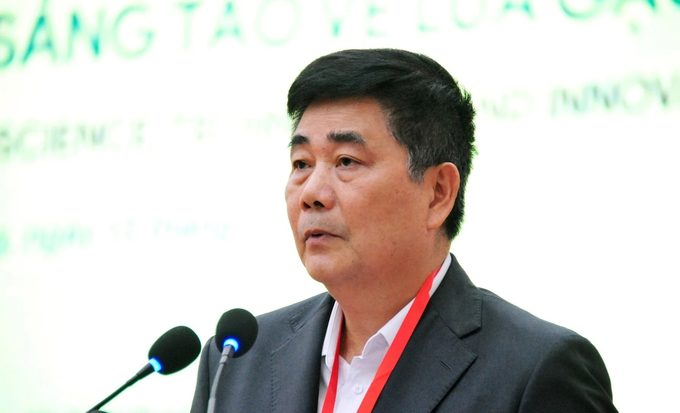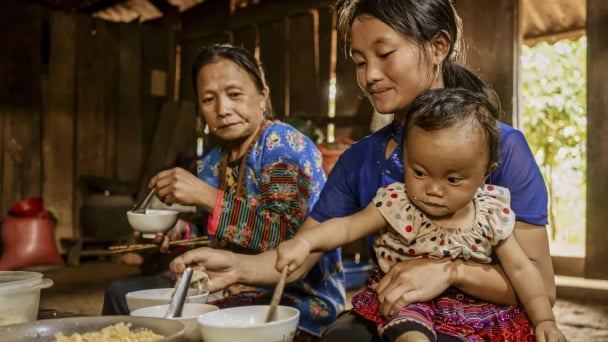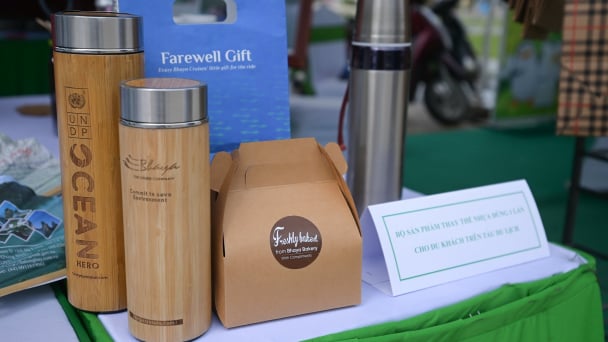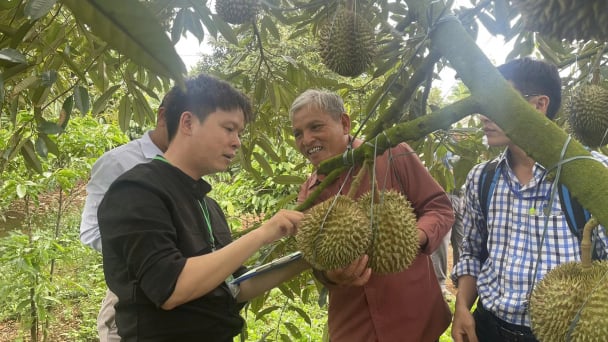June 2, 2025 | 04:34 GMT +7
June 2, 2025 | 04:34 GMT +7
Hotline: 0913.378.918
June 2, 2025 | 04:34 GMT +7
Hotline: 0913.378.918

Mr. Cao Duc Phat raises many problems for the domestic and world rice industry. Photo: Le Hoang Vu.
At the International Conference on Science, Technology and Innovation on Rice, Mr. Cao Duc Phat, Chairman of the Board of Directors of the International Rice Research Institute (IRRI), Former Minister of Agriculture and Rural Development, said that rice is associated with the lives of nearly half of humanity.
After the crisis in the rice market in 2008, countries and the international community have made many efforts to increase output and improve the quality and efficiency of rice production.
"There has been an opinion that the world has enough capacity to ensure rice supply. But what is happening in the global rice market recently shows that the results achieved are not sustainable," Mr. Phat said.
IRRI leaders also pointed out new challenges, especially climate change, requiring all countries' rice industry to adapt quickly and move quickly to reduce greenhouse gas emissions.
In addition, industrialization not only competes and takes away land and other resources but also puts pressure on rice growers to increase income and improve the lives of rice growers to maintain attractiveness not only to consumers but, first of all, the 140 million small rice farmers worldwide.
Throughout the years, many research efforts, creativity and technical advances in rice have been put into production.
Notably, there are many pure and hybrid rice varieties with high yield and good quality rice grown in many Asian and African countries, IRRI Low Glycemic Rice; and perennial rice in China; Many rice varieties are resistant to pests and adverse conditions. Rice growing techniques reduce GHG emissions; Microbial fertilizers reduce the amount of inorganic fertilizer by 30-50% while maintaining and increasing productivity; new generation pesticides; direct sowing technology; Straw processing technology...
According to Mr. Phat, it is necessary to maintain the rice productivity growth rate of about 0.5%/year to continue increasing rice output from about 520 million tons to about 580-600 million tons by 2050, contributing to ensuring rice production to ensure food security and nutrition for about 4 billion people.
Also, the rice industry must reduce emissions by about 10-20% and make farmers' income continue to increase rapidly.

The Government has just approved a project of 1 million hectares of high-quality rice, reducing waste in the Mekong Delta by 2030.
For Vietnam, Mr. Phat said, the biggest challenge is increasing the income of rice growers and adapting to climate change for sustainable development.
Many new technologies and techniques have appeared that improve research efficiency, shorten breeding time, and manufacture materials and equipment with outstanding high efficiency, notably gene editing technology, digital technology, and nanotechnology.
Regarding socio-economics, humanity has been deeply aware and is joining hands to create new market dynamics and financial support to promote new development trends in agriculture in general and in the development of food systems with rice as the core.
They have announced specific mechanisms and policies for the rice industry both internationally and domestically. The government recently approved a project to produce 1 million hectares of high-quality rice.
"For effective development, each country will have its directions suitable to its circumstances. Scientific research needs to meet the requirements of those development directions closely," Mr. Phat commented.
For Vietnam, IRRI leaders believe it is necessary to prioritize research and create rice varieties with characteristics that closely meet the taste and nutritional needs of consumers of different groups to achieve higher market value, technologies and techniques to adapt and mitigate climate change.
However, besides each country's efforts, international sharing and coordination will help each country and the world progress faster in the rice field.
"Hopefully, today's conference will help clarify key directions and solutions to improve the effectiveness of research and technical transfer for farmers and businesses participating in the rice value chain, not only for Vietnam but also contribute to global efforts," Mr. Phat reminded.
By 2030, the 1 million hectares of high-quality rice project aims to form a specialized rice growing area, with an area of 1 million hectares associated with reorganizing the production system along the value chain. The rice growing area in the project will pilot a carbon credit payment policy based on the results of focusing on low emissions associated with green growth. Rice by-products for re-production in the direction of a circular agricultural economy and exploiting values to create many processed products from rice. Successful pilots in the Mekong Delta will be expanded nationwide to develop livelihoods and guide sustainable development for rice farmers. Regarding the national goal, there will be a focus on "green development, emission reduction, high quality" to become Vietnam's rice brand.
Translated by Tuan Huy

(VAN) 30 experts in health, agriculture and environment participated in a consultation workshop to inform the development of a methodological framework aimed at supporting Vietnam’s transition to a sustainable food system.

(VAN) Over the past five years, Quang Ninh Province has vigorously and synchronously implemented the ‘Say No to Plastic Waste’ campaign, yielding positive outcomes in advancing sustainable tourism.

(VAN) The prevention of plastic pollution necessitates collaboration among governments, businesses, and citizens. Today's little things contribute to a future free of plastic.

(VAN) This was the directive given by Deputy Minister Phung Duc Tien during a meeting with the Department of Livestock Production and Animal Health, and relevant stakeholders to prevent and control African swine fever.

(VAN) For the durian industry to succeed, the value chain must fulfill its commitments to the government, the community, and international partners.

(VAN) Vaccinating juvenile pangasius helps reduce disease, antibiotic use, and farming costs, increasing profits for export-oriented farmers in An Giang.

(VAN) Due to a limited supply of workforce and competitive recruitment requirements, businesses struggle to retain talented veterinary human resources.